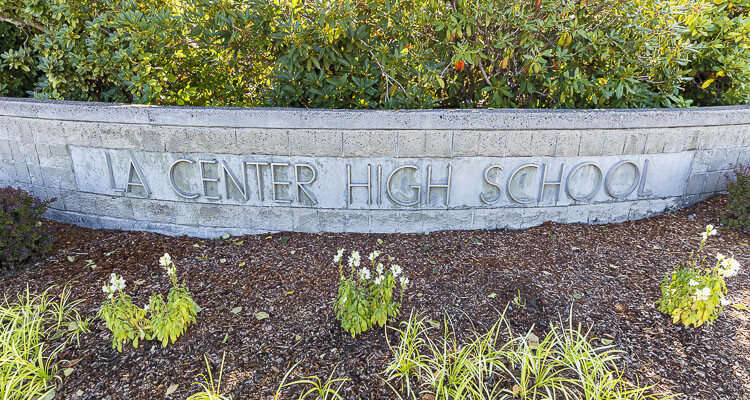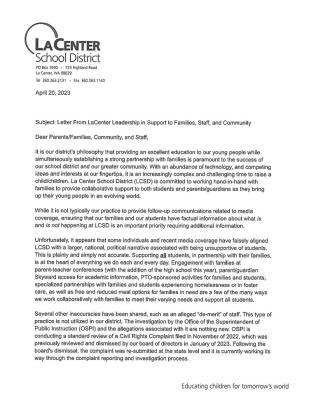
Superintendent Peter Rosenkranz addresses recent media coverage in letter to families
Leah Anaya
For Clark County Today
Several months ago, La Center School District Superintendent Peter Rosenkranz faced backlash for the district’s Gender-Inclusive Schools Policy 3211-P, or the student pronoun policy, which was adopted in November of 2022. Before the change, school staff had taken to privately asking each student their preferred pronouns, and then referred to the student in that way. With the new policy, Rosenkranz said, staff will no longer proactively ask a child to express their preferred pronouns or what name they would like to use, but will instead wait for a student to approach them if they want to go by something different. Further, if a student does make such a request, they will be referred to a counselor to discuss the change with their parents.

Rosenkranz requested via email to teachers at the start of the school year that students not be asked what pronouns they want to use on any type of back-to-school surveys. Thirty-one district employees filed a complaint against Rosenkranz, which was investigated by a third party with no violations of policy found. The same complainants appealed the decision and filed a civil rights complaint against the superintendent, specifically saying that the policy violates the freedom of speech and expression of the students. In response to the complaint, the Washington Office of the Superintendent of Public Instruction (OSPI) opened an investigation to see whether the La Center policy is in line with state law in terms of transgender student policy and procedure (RCW 28A.642.080).
According to the RCW, school districts must adopt a policy relating to students who claim to be transgender that are in line with OSPI’s requirements. OSPI’s requirements, as read in the RCW, say that discrimination is prohibited against students on the “basis of race, creed, religion, color, national origin, honorably discharged veteran or military status, sexual orientation including gender expression or identity, the presence of any sensory, mental, or physical disability, or the use of a trained dog guide or service animal by a person with a disability.” Further, state law dictates that a district superintendent “shall develop rules and guidelines to eliminate discrimination,” including as it relates to “counseling and guidance services to students.” Rosenkranz pointed out that the RCW says that the district has the authority to amend policies to make sure they’re working well in its own district.
Rosenkranz has maintained that he is in favor of working collaboratively with students on issues, whether they are directly related to education or not, by bringing in counselors to the discussion. This includes informing parents of what is happening with their students while they’re at school.
“We are trying to focus on the things that families expect of us,” Rosenkranz told Clark County Today, “and that includes reading, writing, math, history, science. Speaking of science, it’s interesting because people say ‘follow the science.’ Well, we nixed social science in favor of biology. As a former biology teacher, I can tell you for a fact that biological science says that there are chromosomes that dictate gender – there’s XX or XY. Of course there are anomalies, called genetic mutations, but in general that’s how it works. There’s a male and a female, and that’s how the species reproduces. Social science, however, that’s where the construct of gender as a continuum is found.”
Some who have spoken at previous school board meetings have said that it is “dangerous” to involve parents in a discussion with their children when they’re experiencing symptoms of gender dysphoria, but others have said that it is outside of the school’s realm of responsibility to have those types of conversations without their parents involved or informed.
“This argument that it’s dangerous to call parents to tell them their child is identifying as a different gender is not really valid,” Rosenkranz said, “and here’s why. We handle many challenging issues in schools. Technically, any time I call a parent for any reason, there’s a risk that it could turn out poorly for the child. Unfortunately, that’s the reality – there’s child abuse out there, and that’s why we have a whole system set up with CPS and why staff are all mandatory reporters.
“But what we’re forgetting about is a parent’s unconditional love for their children,’’ Rosenkranz said. “I saw on a ‘pride’ website where it says, ‘We’re your first family.’ Well, no, your family is your first family. There’s this trepidation about involving parents because there’s an assumption that all parents are going to harm or treat their children poorly if they find out [that they’re presenting as a different gender in school], and that’s just not true. The best resource for children is their parents. I just recently had a case where a parent thanked me for telling them about what was going on with their child at school [in terms of gender dysphoria]. They might not have agreed with the child’s decision, but they were able to support them through it, and that wouldn’t have been an option had we kept them in the dark.”
Speaking on the condition of anonymity, one La Center staff member told Clark County Today, “I know many teachers and other staff members who agree with Pete [Rosenkranz]. But, sadly, I don’t know anyone who will speak boldly about it. We can’t take a stand in our positions – we aren’t comfortable doing that publicly. Who knows what the consequences would be if we did?”
Rosenkranz recently sent a letter out to the community via email to parents about the situation. “I’m trying to take a rational approach to this conversation that seems very irrational,” he said. “The assumption is, ‘If you’re not with me, you’re against me. Or worse, ‘If you’re not with me, you hate me.’ and that’s completely not true. Hate has nothing to do with it. We just disagree. I engage with people even if we disagree, and I don’t hate them. I respect them and their opinions.
“An educated populace is the foundation of democracy, and families are the foundation of education. And what’s more, I don’t have to define family – it’s a mom and a dad, two moms, two dads, a single mom, single dad … it’s not up to me. But a school being the sole authority on this issue with children and their gender identity, that’s like Les Schwab trying to sell refrigerators. It just doesn’t make sense.”
The letter sent to families on Thursday addressed recent media coverage where the La Center School District (LCSD) was accused of not supporting students as well as issuing “de-merits” to a staff member for asking a student about their gender identity.
In part, the letter from LCSD to families reads:
“LCSD is committed to working hand-in-hand with families to provide collaborative support to both students and parents/guardians as they bring up their young people in an evolving world.
“Unfortunately, it appears that some individuals and recent media coverage have falsely aligned LCSD with a larger, national, political narrative associated with being unsupportive of students. This is plainly and simply not accurate. Supporting all students, in partnership with their families, is at the hear of everything we do each and every day.
“Several other inaccuracies have been shared, such as an alleged ‘de-merit’ of staff. This type of practice is not utilized in our district.
“LCSD students are not prohibited from changing and using pronouns. The procedure simply states that LCSD will not proactively canvas or ask students what pronouns they utilize. There has been some confusion and concern expressed by families regarding whether or not students were required to provide pronouns and at what age it is appropriate to ask. LCSD opted for the middle of the road related to this issue and proactively asks students to provide their names. If they want a different name or pronoun, they can provide that and we will use it in accordance with the law.
“Concerns have also been raised about student safety issues related to policy amendments that incorporate families in conversations about pronouns/names, citing fears about potential parent reactions to students’ name/pronoun preferences. We partner with parents on many subjects that involve critical and emotional topics. In the rare instance when, as a school, we believe a child is in harm’s way, we enact established safeguards, processes, and systems at the local and state level to support students who may be harmed by their parents.
“LCSD will continue to maintain our focus on educational excellence in reading, writing, math, science, art, PE, social studies, and more. Please take a moment to read a book with your child or ask what they are reading and engage in those amazing learning-focused conversations.”
Also read:
- Clark County mourns loss of hometown hero and humanitarian Greg BiffleClark County is mourning Greg Biffle, the Camas High School graduate and NASCAR champion remembered not only for his racing career but for his humanitarian work and disaster relief efforts.
- Opinion: IBR still holding and lying about coming billions in cost overrunsJoe Cortright argues that Interstate Bridge Replacement officials are deliberately delaying the release of an updated cost estimate that he says could push the project toward $10 billion.
- Opinion: Another problem with strike pay from the UI fund – Potential double-dipping, overpaymentsElizabeth New (Hovde) argues that Washington’s new strike pay law risks overpayments and double-dipping unless workers are clearly warned at the point of applying for unemployment benefits.
- Vancouver firefighters spread Christmas cheer through 2nd annual toy driveVancouver firefighters collected and distributed more than 650 donated toys to students at six Evergreen Public School District elementary schools during their second annual holiday toy drive.
- Person rescued after jumping from I-205 BridgeVancouver fire crews and a Port of Portland rescue boat pulled a man from the Columbia River after he jumped from the I-205 Bridge and rushed him to a local hospital.
- Weather update: Heavy rains and strong wind gusts expected for the rest of ThursdayHeavy rain, wind gusts up to 45 mph, and ongoing flood risks are forecast for Southwest Washington as utilities continue restoring power after earlier storm damage.
- BPA responding to widespread weather-related outagesBonneville Power Administration crews are responding to more than 40 transmission outages caused by extreme weather across the Northwest.












